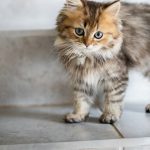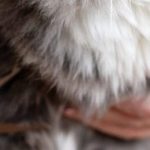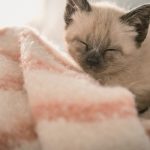Table of Contents
My Siamese companion often surprises me by grooming my hair, and I’ve found I’m not the only pet parent to witness this curious behavior. Cats are known for their meticulous grooming habits, but when a cat starts licking your hair, it can be puzzling and endearing. There are several reasons why our feline friends may be drawn to our locks, from affection to marking territory. It’s a behavior deeply rooted in their instincts, and while it can seem odd, it’s typically a sign of their comfort with us.
Understanding why cats groom is essential. In the wild, cats will groom their kittens and fellow pack members to bond and show care. When my cat licks my hair, she’s extending that same affection to me. It’s not about eating or grooming your hair for cleanliness; it’s a social behavior that strengthens our relationship. So next time your cat begins to affectionately lick, know it’s their way of saying, “You’re part of my family.”
Decoding the Reasons Behind Your Cat’s Peculiar Habit
As a cat mom, I’ve learned that feline behaviors are often complex, and the act of my cat licking my hair is no exception. There are at least 6 reasons why cats may engage in this behavior. It ranges from the simple pleasure of tasting the natural oils on our scalp to mutual grooming, which in the feline world, is a way to socialize and show trust. Cats are also known to groom the heads of their human companions as a way to share their scent, which for them, is a form of communication.
When multiple cats live together, you might notice them engaging in mutual grooming, which helps reinforce their social bonds. Similarly, when my cat licks my hair, she could be acting on instinctive behavior to create a communal scent. It’s not always about the smell of citrus from my shampoo, but more about her instinctual need to mark her family members with her scent. She’s claiming me as part of her pack, and while it might mess up my hairdo, it’s a gesture that comes from a place of love.
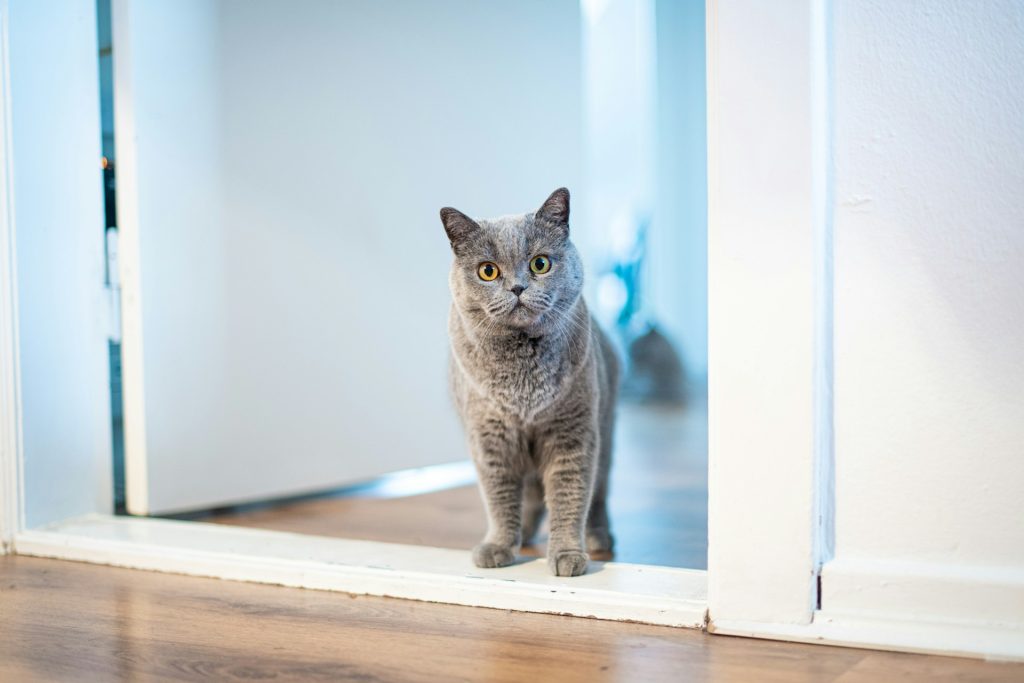
Affection or Territory? Exploring the Motives
Each time my Siamese cat begins to pet me with her tongue, I’m reminded of the strong bond we share. Grooming is a cat’s expression of love and a way to strengthen the emotional connection with their owners. It’s their version of a hug or a kiss, a gesture that transcends species. While I can’t groom her back in the same way, I show my affection through gentle strokes and cuddles, which she receives with contented purrs.
When my cat meticulously licks at my hair, she’s not only grooming me but also leaving her scent behind. Cats have scent glands on their faces, which they use to mark their territory and familiar objects – including their humans. By licking my hair, she’s depositing her scent to say, “This is mine.” It’s a natural behavior that helps her feel secure in her environment and with her chosen family.
When Playfulness Leads to Hair Licking
Playfulness is another reason my cat might start licking my hair. Sometimes, it seems like she treats my hair as cat grass, playfully nibbling and licking as part of her interactive playtime. Cats often enjoy a variety of textures and sensations, and hair can provide an interesting experience for their curious tongues. It’s a harmless way for her to explore her environment and engage with me in a fun, albeit slightly ticklish, manner.
When these playful grooming sessions happen, it’s important to ensure they remain gentle and safe. If it seems like she’s becoming too enthusiastic, I’ll redirect her attention with a toy or a scratch behind the ears. It’s all about finding a balance between indulging her playful spirit and keeping my hair intact. After all, a playful cat is a happy cat, and I’m all for activities that keep her joyous and active.
Stress Relief and Comfort Seeking in Cats
My cat often finds solace in grooming herself, and sometimes, that includes licking my hair. It’s a comforting behavior that helps her relax and unwind, much like how we might enjoy a warm bath or a massage. When she’s grooming me, it’s her way of sharing that sense of tranquility, and it’s a ritual we’ve come to enjoy together. It’s our quiet time, a moment to bond and feel at ease in each other’s presence.
During these moments, I make sure to offer her plenty of pets and affection, embracing the opportunity to provide her with the same comfort she seeks. It’s a mutual exchange of reassurance and love, and it’s one of the many ways we communicate and connect on a deeper level. So, as she licks my hair, I pet her gently, letting her know that her comfort is my comfort, too.
Intervention Strategies: Redirecting Your Cat’s Licking Habit
If my cat’s grooming behavior becomes problematic, I have a few strategies up my sleeve to redirect her licking habit. Introducing cat grass and engaging toys can provide healthy alternatives for her to chew on. It’s all about creating an enriching environment that satisfies her instincts while also preserving the peace in our home. This way, she can express her love and curiosity without turning my hair into her grooming salon.
Techniques to Discourage Unwanted Hair Licking
As a cat mom, I’ve learned that discouraging my fur babies from licking my hair requires some creativity. One method I’ve found effective is to gently redirect their attention when they start. I’ll offer a soft toy or initiate a play session with a wand toy to keep them engaged. Another technique is to change my hair products; sometimes a particular scent can be too enticing for my cats. Also, keeping my hair tied up at night can prevent those surprise grooming sessions while I’m sleeping.
Providing Appropriate Alternatives for Grooming and Play
When my Siamese starts eyeing my hair as if it’s the ultimate plaything, I know it’s time to introduce alternatives. For grooming, I’ve found that giving them their brushes to rub against can satisfy their need to groom and be groomed. As for play, I keep a variety of toys on hand, like puzzle toys that challenge them or soft plushies they can safely groom. It’s all about keeping their paws and tongues busy with items meant for feline fun.
Creating an enriching environment is key. I make sure to have interactive toys like laser pointers and feather wands to engage their hunting instincts. Additionally, offering them cat grass or safe chewable items like teething toys or dental treats can provide a suitable outlet for their chewing behavior. These strategies not only help prevent hair licking but also contribute to their overall happiness and well-being.
When to Seek Professional Advice for Compulsive Behaviors
If I ever noticed that the hair licking became excessive, I wouldn’t hesitate to consult a cat behaviorist. Compulsive behaviors can sometimes indicate underlying issues. A professional can offer insight into why my cat might be fixating on my hair and provide personalized strategies to help redirect this behavior. It’s important to address these concerns early to ensure the health and happiness of both my cats and myself.
Moreover, if the hair licking was accompanied by other worrisome behaviors, or if I suspected health concerns like hyperthyroidism could be influencing their actions, a trip to the vet would be my next step. It’s essential to rule out medical conditions that could be causing or contributing to their behavior and to receive guidance on the best course of treatment if necessary.
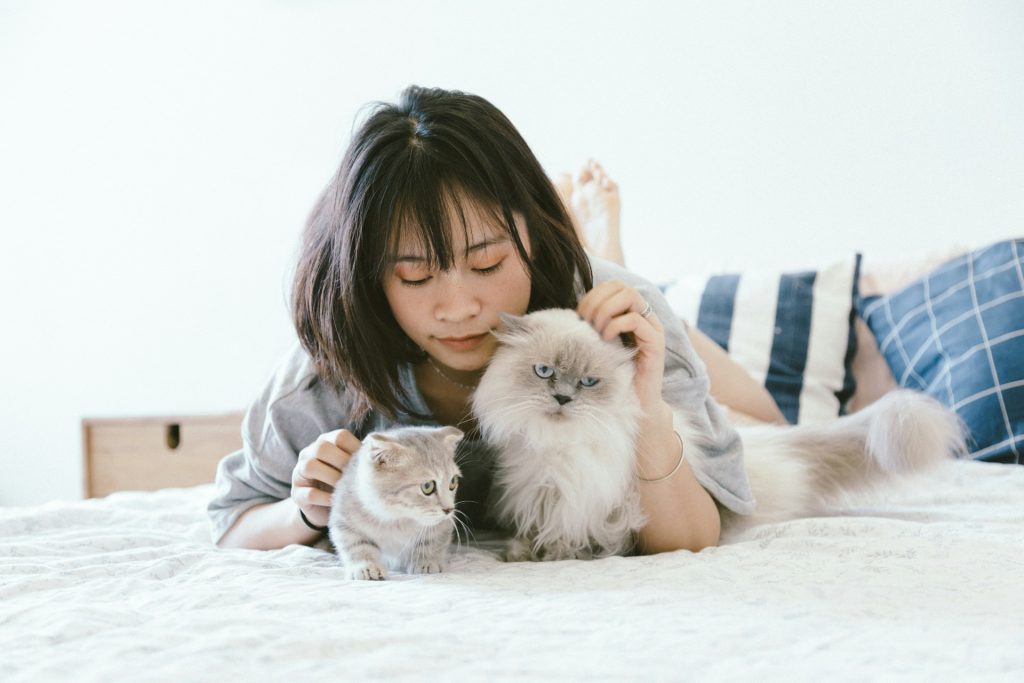
Unraveling the Mystery: Why Does My Cat Lick My Hair?
When my cat licks my hair, it’s a moment that can be both endearing and puzzling. In the vast majority of cases, this behavior is a sign of affection and bonding. Just as cats groom other cats they are close with, they may lick their owner’s hair as a way to show care and establish a social bond. Their rough tongue can catch loose hairs, much like they would do when grooming their hair coat or that of a fellow feline. But it’s not just about affection; cats also groom to mark their scent and claim their territory, which in this case, happens to be me!
While many assume a cat licks your hair because they like the taste of the shampoo or conditioner you use, it’s important to be cautious as some products can be toxic to cats. If you notice your cat is licking your hair excessively, it might be time to ensure your cat has plenty of other stimulating activities in their environment to solve the problem. Over-grooming can lead to issues like intestinal blockage, particularly if they ingest a lot of hair. Always keep an eye on your furry friend’s behavior, and don’t hesitate to consult with an applied animal behaviorist if you suspect an underlying medical or behavioral issue.

Hi, I’m Zoey, a devoted mom to two charming Siamese cats. My passion lies in assisting fellow pet owners in providing optimal care for their cats. On CatsEuphoria, I share practical tips and relatable stories, inviting you to join me in appreciating the authentic bond between humans and our beloved feline companions.


